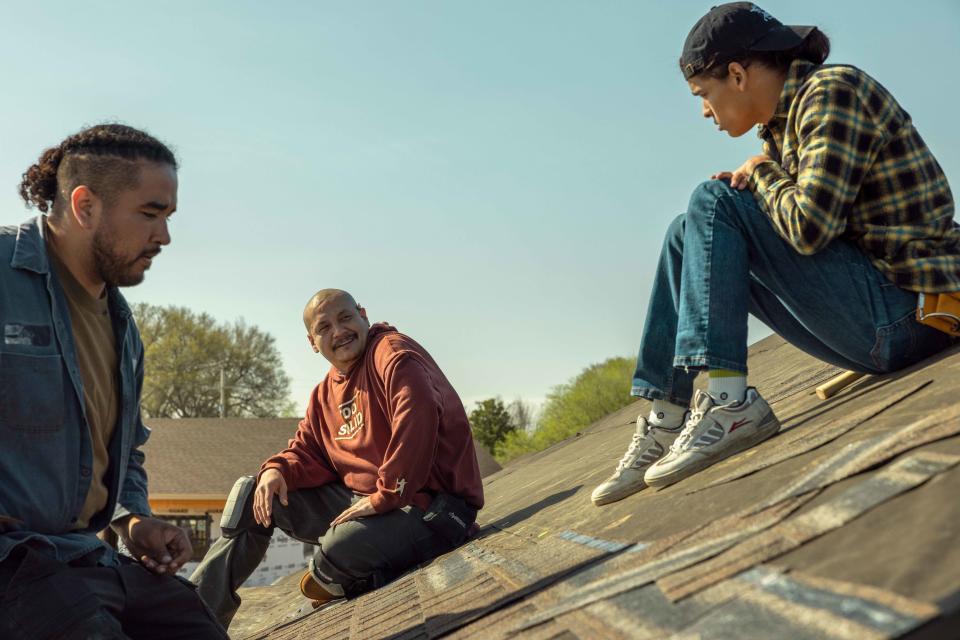True Grit: How the Music of ‘Reservation Dogs’ Brings Its Characters to Life

- Oops!Something went wrong.Please try again later.
If, at its heart, “Reservation Dogs” is a story of about a group of young kids growing up and finding their way, the show’s rural Oklahoma setting is its soul. The specificity of the series’ humor and tone, its blend of the mythic and the mundane (embodied by Dallas Goldtooth’s warrior spirit with chill vibes), come through in all the ways the series captures being not just from but of this particular place. You can literally see it in how the camera captures particular details of the landscape or the wide shots of greenery intermingling with industrial decay.
But you can also hear it in how the show uses music. Certain tracks provide a sense of emotion and place that feel universally relatable, but are uniquely the show’s.
More from IndieWire
'Reservation Dogs' Season 2 Trailer: Taika Waititi's Award-Winning Series Returns
Sterlin Harjo on the Importance of Oklahoma in 'Reservation Dogs'
The series doesn’t have one sound. It is instead a glorious mishmash of rock, punk, country, protest anthems, rap, obscure psychedelia, and also, memorably in Episode 2 of this new season, Tom Petty. However, the overall aesthetic is, according to music supervisor Tiffany Anders, one that “has to sound DIY. It had to have some integrity and some sort of like punk aesthetic to it whether that be in country music or indie rock or Tom Petty. It [has to have] grit to it.” It’s that grit that often helps ground the humor or sharpen the show’s more dramatic, emotional turns. In Episode 3 of this new season, “Roofing,” Anders and series creator Sterlin Harjo find a way to make one song do both.
The story is a relatively simple one. Bear (D’Pharaoh Woon-A-Tai) has been in a bit of depressed rut since the start of the season but starts a weekend job assisting some roofers from the Rez. Bear realizes that one of the guys at the site (Michael Spears) is the father of his old friend Daniel (Dalton Cramer), who committed suicide a year before the series begins. Bear learns how to drive a nail and also how to empathize with someone in pain – both equally important rites of passage to manhood. At the end of the episode, Elora (Devery Jacobs) reappears at Bear’s window, back in his life and on the Rez because her grandmother is dying. Bear is (if only a little) better able to deal with this turn of events than he was at the episode’s start. And if you thought the best music to bring out the emotion in all of this was English psychedelic space rock from the 1980s, well, then congratulations on being Sterlin Harjo.

Shane Brown/FX
At key intervals throughout the episode, the show uses Spacemen 3’s “I Love You” to transition between environments both physical and emotional. It starts up first when Bear is trying to “age his tool-belt” (that his mother just bought for him; “It’s a nice one!”) to impress the guys, covers the group’s arrival and setup and the site, and appears after two key conversations while Bear is working. “That surprised me because I had had a song picked out for Uncle Charlie (Nathan Apodaca)… I had had to find a song for him to dance to on the roof and I picked this like super funky 80s, disco-y, weird song. And then everything got replaced with Spacemen 3. And I was like, ‘this is even better,'” Anders said.
What makes it better is the track has a smooth, propulsive base refrain at the heart of it, which matches perfectly when Uncle Charlie and Marc Don (Chad Charlie, who also co-wrote the episode with Harjo) drive Bear to the site. There’s a control, repetition, and unspeakable coolness to the way the song opens; its laid-back rock vibe is everything Bear wants for himself, which makes the moments that starts or stops playing all the more interesting. The show uses it to paint a sense of how Bear sees this potential path for himself, and also how he doesn’t quite fit or measure up to the sound just yet. “I think that makes the whole show more real in terms of what’s happening in Tulsa and not pigeonholing the kids,” Anders said. “You know, I like casting a wider net.”
Anders says she has to think a lot about teenagers and small towns when making musical selections for the series. Some of it comes from hearing stories “about Harjo growing up there and him going to punk shows in Tulsa.” But, as in Episode 3, some of it comes from the way that music creates contrast with the action on screen. Bear has a very honest conversation about growing and grief with the spirit of a former warrior; but it happens in a set of Porta-Johns decked out in graffiti (the sparkly pink “Land Back” just behind Woon-A-Tai’s shoulder is a highlight). The show supports the heartfelt dialogue with a subtle but razor precision in the sound design, the noise of construction ebbing and flowing as Goldtooth riffs, but falling away and being replaced with birdsong and more natural noise as he speaks about the importance of grieving, “so that they know that they can go.” At the scene’s end, Spacemen 3 comes crashing back into the soundtrack, the bass still rolling, wordlessly showing all the ways that life continues to go on.

Shane Brown/FX
The virtue of music on “Reservation Dogs” is its ability to dig beyond whatever is the first or most obvious instinct; the show instead uses tracks that both guide the audience through characters’ wants and dreams and provide a sense of perspective on how close (or more often) far away they are from those desires. This, for Anders, is the “texture” music adds to a scene, and it can be smooth and sly like Spacemen 3 or rougher and more pointed, as in the track she chose to score Elora and Jackie (Elva Guerra) leaving town in the first place.
“It has that surprising, great thing. You could just have put in a hip hop song or whatever on the radio as they’re leaving. But I feel like the fact that it’s this, you know, a 1970s country song about leaving. It adds that kind of grit and realness to the scene,” Anders said. “I love that it’s not playing up to their characters, you know? Jackie’s got a Wutang shirt on. They’re teenagers. Would they be listening to this song? I doubt it, but, but I love that brings that texture to the quality of them leaving.”
Best of IndieWire
‘The Lord of the Rings’: Everything You Need to Know About Amazon’s Big Money Adaptation
Charlie Cox and Vincent D'Onofrio Set to Reprise 'Daredevil' Roles for Marvel Series 'Echo'
'The Last of Us': Everything You Need to Know About HBO's Adaptation
Sign up for Indiewire's Newsletter. For the latest news, follow us on Facebook, Twitter, and Instagram.

